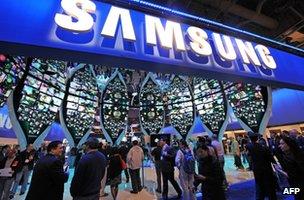 Samsung has confirmed its next high-end smartphones will feature 64-bit processors.
Samsung has confirmed its next high-end smartphones will feature 64-bit processors.
The announcement follows the launch of the iPhone 5S, the first handset to include the technology.
Apple boasted its A7 chip offered “desktop-class architecture”.
However, experts say most apps are unlikely to see much immediate benefit from the shift from 32-bit tech and that it could introduce compatibility problems in the future.
The Android operating system would need to be updated before Samsung’s Galaxy devices could take advantage of a shift to 64-bit.
Faster work
The number of bits in relation to a microprocessor affects the size of the numbers that can be handled by its registers – a type of storage that can be read very quickly.
This has implications for the amount of memory that can be directly accessed without data having to be swapped back and forth to slower storage.
In the case of 32-bit architecture, the amount of memory than can be addressed is two to the power of 32, in other words 4.3 billion values, or four gigabytes of memory.
In the case of 64-bit architecture the processor can theoretically address 18,400,000 trillion values.
If a program has been written to take advantage of a 64-bit operating system, it should mean the processor can access data that is in this larger memory rather than retrieving it from, for example, the hard disk.
This speeds up the whole processing chain.
Another advantage is that the processor can take advantage of machines with more physical memory.
Operating systems written for 32-bit chips can only access up to 4GB of RAM, but those written for 64-bit processors can, in theory, support up to 16 billion gigabytes of RAM.
Boosting the amount of RAM allows software to become more complex and the computer to run more programs simultaneously without having to swap as much data to other types of slower memory.
However, it also makes the equipment more expensive and power-hungry.
For that reason, smart-device makers have tended to shy away from taking advantage of 32-bit chips’ upper RAM limit.
Samsung’s forthcoming Galaxy Note 3 handset goes the furthest, with 3GB of RAM. The device also features a bigger-than-normal 3,200 mAh battery.
http://www.bbc.co.uk/news/technology-24060694” > Read more
